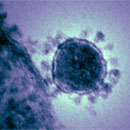New ‘Pirola’ variant of COVID is spreading fast, has experts concerned
New York Post
Fri September 1, 2023
As COVID-19 cases continue to rise nationwide, a new variant dubbed “Pirola” has experts worried.
Also referred to as BA.2.86, Pirola is a highly mutated variant of the Omicron strain of the coronavirus, which emerged in 2021 and led to a frightful spike in COVID-19 cases and deaths.
“When Omicron hit in the winter of 2021, there was a huge rise in COVID-19 cases because it was so different from the Delta variant, and it evaded immunity from both natural infection and vaccination,” infectious disease specialist Dr. Scott Roberts said in a Yale Medicine bulletin.
The bulletin states that “there is some reason to worry, in that this variant … has more than 30 mutations to its spike protein,” referring to the proteins on the surface of the virus that allow it to enter and infect human cells.
“Such a high number of mutations is notable,” Roberts said. “When we went from XBB.1.5 to EG.5, that was maybe one or two mutations. But these massive shifts, which we also saw from Delta to Omicron, are worrisome.”
The three biggest questions facing medical experts are: How transmissible is Pirola? Will it bypass existing immune defenses? How lethal will it be for those unlucky enough to get infected by it?
COVID-19 cases have been ticking upward nationwide since mid-summer.
CDC
“Nobody knows right now, but studies are ongoing,” Roberts said.
The Pirola variant was initially detected in Israel and was later identified in Canada, Denmark, the UK, South Africa, Sweden, Norway, Switzerland and Thailand, according to the CDC.
By August, it had surfaced in Ohio, Virginia, Michigan and New York. And Thursday, Dr. S. Wesley Long of Houston Methodist Hospital reported that he had isolated a Texas case of the Pirola variant.
The rapid spread of Pirola “doesn’t look good right now,” Dr. Eric Topol, director of the Scripps Research Translational Institute in La Jolla, Calif., told Reuters.
Pirola’s multiple mutations make it “radically different in its structure” compared to earlier coronavirus variants, Topol said.
As far as Pirola’s severity is concerned, “it is too soon to know whether this variant might cause more severe illness compared with previous variants,” the CDC stated.
Testing for COVID-19 has revealed that the Pirola BA.2.86 variant is spreading quickly.
“CDC is closely monitoring hospitalization rates to identify any potential early signals that the BA.2.86 variant is causing more severe illness.”
Our current levels of immunity, whether from vaccination or prior infection, also remain to be seen.
The new booster shots, expected to be available later this month, were developed to target the Omicron subvariant XBB.1.5.
Nonetheless, the boosters “will likely be effective at reducing severe disease and hospitalization” from BA.2.86, the CDC states. “That assessment may change as additional scientific data are developed.”
“The vaccine is still going to provide you great defense against illness and death,” Long said.
Other experts agree: Despite Pirola’s mutations, “it’s important to remember that it’s still the same virus at its core, so the same prevention methods — masking, vaccination and hand-washing, among others — can help people avoid infection,” Roberts said.





 Share your thoughts in the Forum
Share your thoughts in the Forum